Prostate cancer: Survivors talk radiation, loose bowels and battling a disease more common than you think
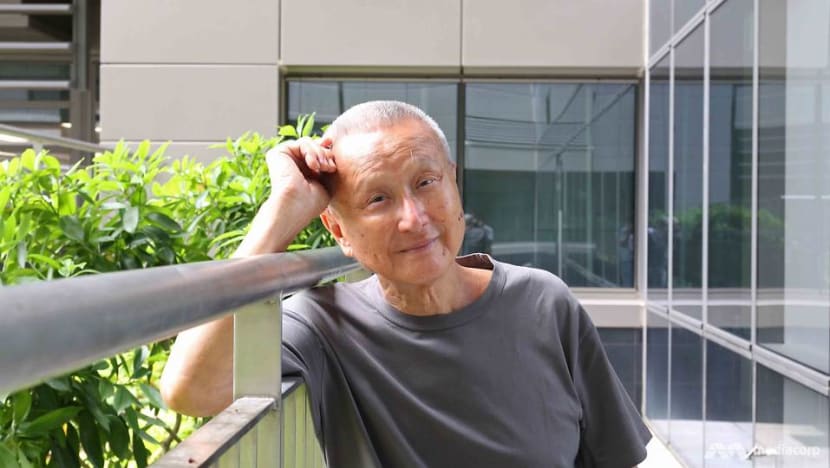
Mr Henry Chia went through 39 sessions of radiotherapy and is now recovering from prostate cancer. (Photo: Aqil Haziq Mahmud)
SINGAPORE: During a regular medical check-up late last year, Ming (not his real name) received the first hint that his body was not as healthy as he thought it was.
A blood test had showed his prostate-specific antigen (PSA) level was higher than normal, a symptom of prostate cancer.
PSA is a substance produced by the prostate, a walnut-sized gland in the male reproductive system that also produces fluid which nourishes and transports sperm.
Ming, 48, went for a series of scans and eventually a biopsy that confirmed the dreaded news. In February, he was diagnosed with stage 1 prostate cancer.
"I still can recall the day when I actually received the news," Ming told CNA in a video call on Monday (Nov 23), in conjunction with Prostate Cancer Awareness Month.
"I was actually a bit upset. Even though I knew that my PSA was higher, I looked at my age, there's no history of prostate cancer in my family, and I do always exercise. So it was a bit hard to stomach when he broke the news to me."
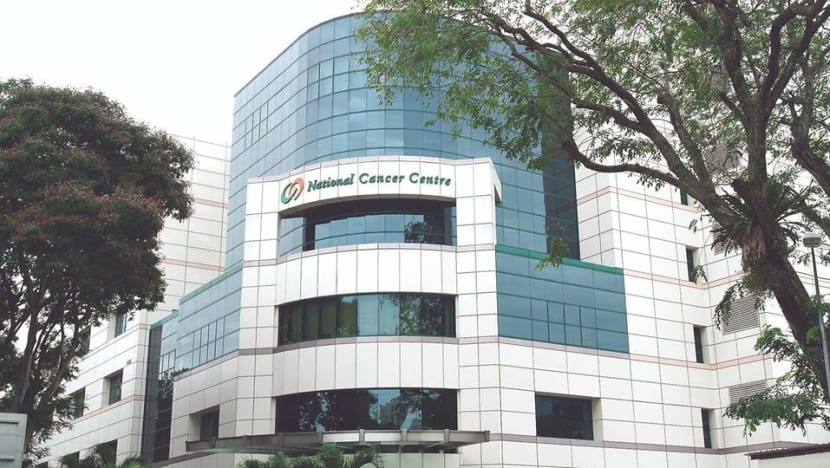
Prostate cancer is the third-most common cancer in Singaporean men, with the risk of getting it increasing beyond the age of 50. Those with a family history of prostate cancer are at a higher risk.
In 2019, the National Cancer Centre Singapore (NCCS) saw 531 new prostate cancer patients, almost a quarter of which were aged below 65.
"I used to think that prostate cancer is only for the older people, until it happened to me," said Ming, who works in the education sector.
"If it can happen to me, I believe it can happen to someone who's in his 40s. It has changed my mindset that it's possible."
READ: Consumption of sugary drinks linked with cancer risk: Study
Dr Jeffrey Tuan, a senior consultant at NCCS' division of radiation oncology, said more awareness is needed to recognise possible symptoms of prostate cancer in light of Singapore's rapidly ageing population.
"This will allow early detection and timely intervention or treatment of the disease. Early diagnosis reduces the chance of cancer spreading to other parts of the body," he said.
Dr Tuan said prostate cancer could be a slow progressing disease that causes no symptoms in its early stages, and might develop over months to years.
The most common symptoms include an elevated PSA, frequent urination or difficulty passing urine. But these are also symptoms of an enlarged prostate that is not cancerous, meaning additional testing could be required.
READ: Under the age of 45? What younger women need to know about breast cancer
Like Ming, former civil servant Henry Chia, 87, did not have any major health issues when a general check-up four years ago showed he had an elevated PSA.
Over the next one-and-a-half years, Mr Chia took several tests that showed his PSA continued to rise, but he decided against going for a definitive biopsy as he felt physically fine and the procedure was known to cause complications.
But in December last year, Mr Chia had stomach pains for about five days. On the last day, the pain was so intense that he got dizzy. Mr Chia was warded at the Singapore General Hospital, where he was again advised to go for a biopsy.
Mr Chia eventually agreed to go for a newer and safer type of biopsy on Jan 15, and two weeks later he was diagnosed with stage 2 of a rare and aggressive form of prostate cancer.
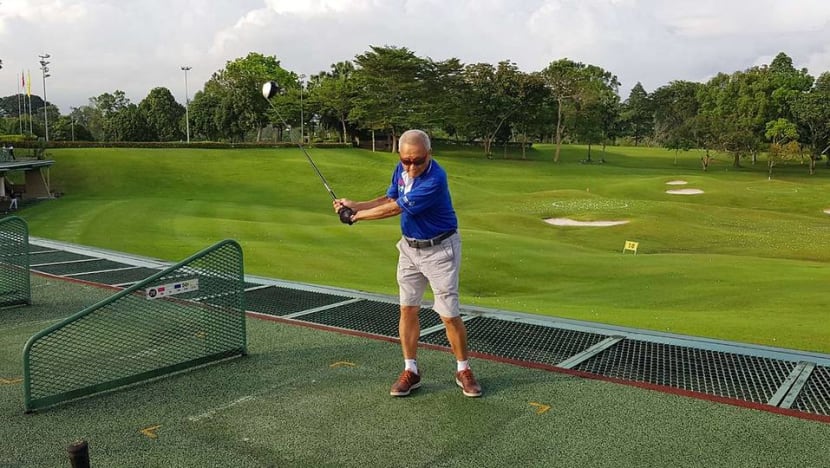
Mr Chia, who lives a healthy life by going swimming, golfing and taking daily walks, said he was mentally prepared by that point.
"I wasn't anxious because I had almost three years of preparation; it didn't come suddenly," he said.
"And during that time, there was always a possibility that it could be cancer. So when it was confirmed, I said: 'Okay, what's the best thing to do?'"
Mr Chia said he did not question why something like this had happened to him as nobody could know the answer for sure.
"It can happen to anybody, whether you're living a healthy life or bad life or whatever. You read it all over," he said. "Sometimes it could be the environment or whatever. I think certain questions should not be asked."
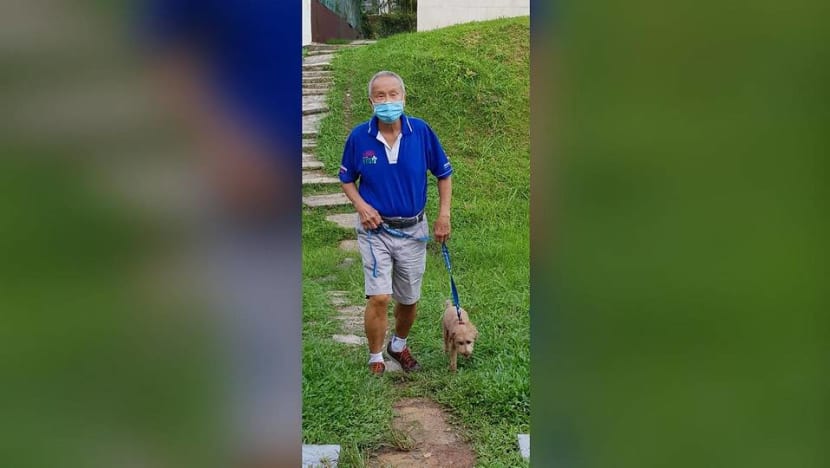
While Mr Chia said he was "not afraid of death" due to his faith, he recalled the doctor scheduling a follow-up six months later.
"In my head, I said: 'It can't be that serious if (he will see me) six months later,'" he added, laughing.
Ming, who has a son and daughter aged 15 and 12 respectively, said his children reacted differently when they first heard his diagnosis.
"My son is a very logical person and he told me that it's curable," he said. "He had read up about it, so he told me all the good things about it. My girl was a bit emotional, but after hearing what her brother had said, she calmed down."
TREATMENT FOR PROSTATE CANCER
Dr Tuan said there are effective methods of treating prostate cancer that can achieve cure rates of 90 to 95 per cent at five years if the cancer is detected earlier.
"Radiotherapy and surgery are the most established treatment for prostate cancer with equivalent cure rates," he said.
The side effects of either option are different. Surgery could lead to sexual dysfunction or an inability to control urine, while radiotherapy could cause bleeding in stools and urine years after its completion.
"Another difference is that surgery involves one treatment in the operating room with a short hospital stay, while radiotherapy involves regular attendances at the cancer centre over two to eight weeks," Dr Tuan said.
READ: Why that heartburn might be stomach cancer – and how salty food increases the risk
The most common barriers for patients seeking radiotherapy, Dr Tuan said, are related to the fear of late effects of radiation exposure, associated with radio nuclear accidents like Chernobyl and Fukushima.
"It should be stated that radiation, if delivered in an accurate and precise manner, will be able to eradicate cancer cells but preserve function of normal tissues and organs," he added.
Mr Chia was advised to go for radiotherapy, with a course of hormone injections every three months. Surgery to remove the prostate was not recommended due to his age and the fact that his heart had stopped twice during the biopsy.
Doctors decided that Mr Chia should go for 39 sessions of radiotherapy over three months starting April. This would take place at NCCS, every day except on weekends and public holidays.
EXTERNAL BEAM RADIOTHERAPY
Mr Chia went for a type of treatment called external beam radiotherapy, where he would lie perfectly still on a treatment table before a machine rotated around him and delivered the radiation over a few minutes.
While Mr Chia said the procedure was painless, the preparation required a lot of self-discipline. Before every session, he had to clear his bowels and drink two cups of water to ensure his bladder was full.
"This required a strict diet regime and time planning," he said.
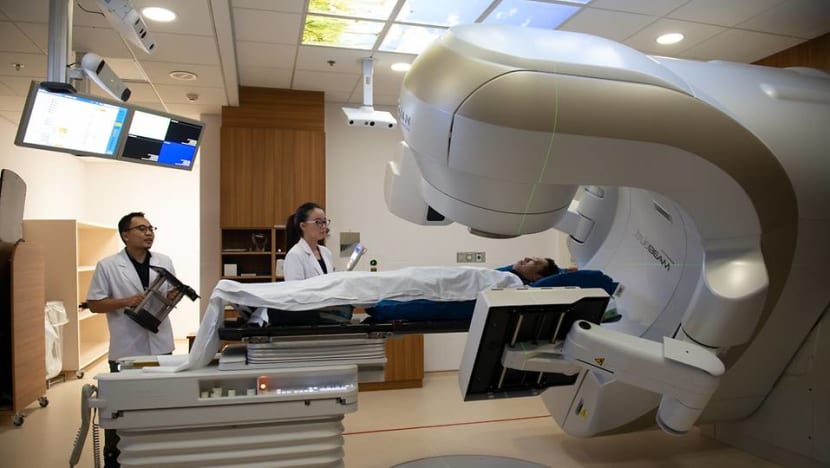
Furthermore, Mr Chia found it tough getting used to exposing his nether regions during the procedure.
"That's the hardest part as a male; you are completely exposed," he said. "I don't want to use the word demeaning because it is not. It is demeaning only in your own self."
Mr Chia also counted the number of times the machine spun around him, anticipating the end of the procedure.
"Every day, I looked hard at the dates of my radiotherapy appointments, wishing for the last date on my attendance card to arrive quickly," he added. "Thirty-nine days seems so unbearably long."
Then about nine days after the first session, the side effects started to kick in.
TOILET RUNS
Mr Chia would get loose or painful bowels, and then a month after, sudden or uncontrollable urges to urinate or defecate. This was especially troublesome when he was out, so he adapted by bringing napkins or a change of clothes.
The urges happened a few times, and once when he was out shopping. He ran to a toilet but it was too late, so he had to discard his underwear. Mr Chia's wife, a doctor, suggested wearing diapers, but he felt it was inconvenient.
"You're always just 10 seconds too late," he said. "You got to take everything out, and in that instance you're less quick than usual. I wasted three pieces of underwear."
These episodes lasted for three months, but have gone away now.
"The cancer treatment was a long, lonely, difficult and heavy-burdened journey, complicated by COVID-19 restrictions," Mr Chia added.
"But it was mitigated by reliable information and advice from our hospital staff, who fully understand the physical and psychological stress of patients. They all go out of their way to be helpful, and worked with patience, kindness and concern."
READ: ‘Our little miracle’: British boy who came to Singapore for treatment for aggressive cancer heads home
Ming also chose radiotherapy after studying the available options and speaking to a support group called the Walnut Warriors. He decided that the treatment was the best for his age in terms of its side effects and possible outcomes.
Ming went for five sessions over two weeks, and the side effects were not as severe. During the first week, he found it difficult to hold his bladder, and woke up about five times every night to urinate.
"By the fifth time you wake up, you had no mood to go back to sleep," he said. "So it actually affected me during the day. But I'm very thankful that I was working from home. So if I was tired, I could rest."
These side effects lasted for a few weeks before things went back to normal.
PERSEVERANCE
Despite the challenges, Mr Chia, who lived through the Japanese occupation and described himself as fiercely independent, remained resolute to do what it takes.
He refused to bother his wife, even when he said the treatment seemed to worsen his eczema and he could not reach the parts that itched. He insisted that she need not send him to his radiotherapy sessions unless he needed help finding the place.
She only stepped in by ensuring he ate food that was good for digestion, making it easier to clear his bowels before going for treatment.
"And particularly in my case, my faith in God has given me the necessary strength and hope for a full recovery," Mr Chia added.
READ: A Bangladeshi worker is dying from cancer. Singaporeans made sure he got his last wish to go home
When Ming was asked whether his diagnosis brought any stigma, especially because some treatments could cause sexual dysfunction, he said there would always be medical solutions if that happened.
"I think what you can control is to be healthy," he said, adding that he has not seen such side effects from radiotherapy. "If it happens, then we'll take it one step at a time."
Ming also said some who found out about his condition immediately thought it had something to do with his diet. Instead, he felt it was "more comforting" to hear how others advised him to focus on the positives.
THE GOOD NEWS
After completing his radiotherapy, Ming's PSA level returned to normal, and doctors said he did not have to go for further treatment. He would only have to take a PSA test every three months.
Ming said the recovery has made him exercise more often and empathise better with other cancer patients. He also advised others to go for regular check-ups.
"I totally agree that if you feel all right, it doesn't mean that you have no problems," he said. "I felt all right, but I had a problem."
WATCH: Parents collect son's PSLE results after he died from cancer
Mr Chia's PSA level is also back in an acceptable range, although he has to continue with his hormone injections every three months for two years. Nevertheless, his doctor said things were "looking good".
Mr Chia advised others fighting cancer to lead a healthier lifestyle and to listen to expert advice. He is a huge advocate of stretching exercises and debunking "nonsensical advice from friends".
WATCH: Singaporean mother fights breast cancer, far from home during COVID-19
Dr Tuan said men aged over 50 with a normal risk of prostate cancer should discuss with their doctors the risks and benefits of prostate cancer screening.
Younger men who have a strong family history, for example, a brother or father with prostate cancer, or family history of breast cancer, should be aware of the symptoms and discuss management options with their doctor, he added.
READ: Uncomfortable but painless - Rectal screening for prostate cancer is nothing to fear
"A healthy and balanced diet and regular exercise may reduce the likelihood of developing prostate cancer," he stated. "Development of suspicious symptoms should prompt a visit to the doctor to discuss if further testing is required."
Mr Chia, who together with his wife has conducted several medical camps in remote parts of Nepal, said he wants to live the rest of his life purposefully.
"If I still have the time, I will devote it to doing what I can for people," he added.












